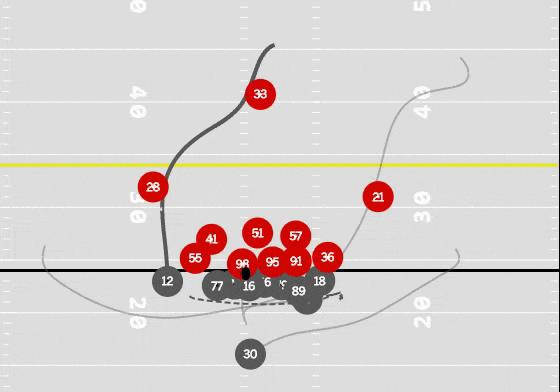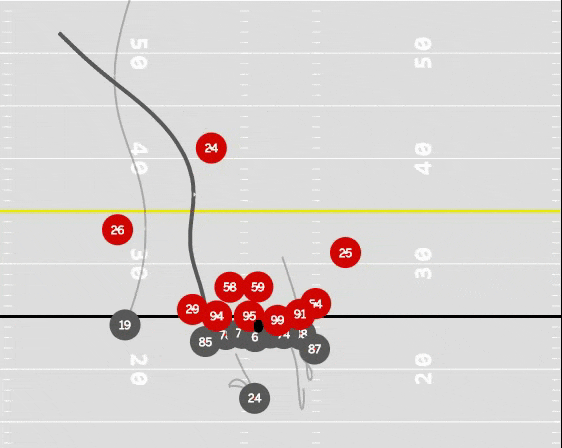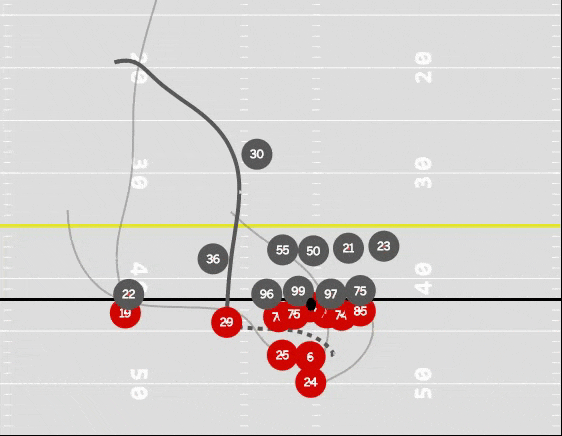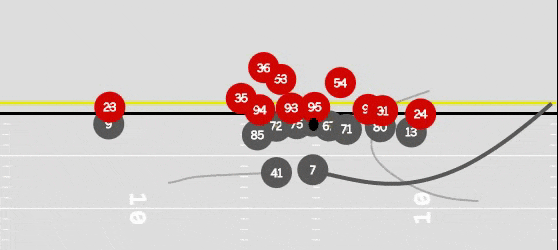The way NFL teams use personnel is different from when I played from 2000 to 2006 as a defensive back. You don't see as many old-school fullbacks with the neck rolls, digging out linebackers in traditional two-back sets. The tight end position? Much more versatility and speed there. Those guys can move. And it leads to positive matchups against linebackers, safeties or even slot corners when the big boys flex from the formation.
That also means the way offenses line up has changed too. Sure, we still see a ton of three-wide receiver sets. But with offenses spreading the field more than ever -- and the passing game becoming more horizontal at times -- the new-school approach has filtered into offensive game plans with personnel, formation and alignment.
Let's take a look back at 2018 and evaluate the offenses that excelled at 12 different personnel groupings. I'll tell you which teams ran each personnel the most and the least. And I'll tell you which ones ran it the best -- and who could dominate in 2019. Here we go:
Jump to a personnel grouping:
11 | 21 | 12 | 13 | 22 | 20
23 | 31 | 10 | 2 QBs | 02 | 00

11 personnel (1 RB, 1 TE, 3 WRs)
Why it works: With a tight end on the field, offenses can pick up an extra blocker on the line of scrimmage in pass protection while adding another gap to attack in the run game. Plus, tight ends with pass-game upside give offensive coordinators another weapon in the toolbox to complement the three wide receivers on the field.
The team that ran it most: The Los Angeles Rams logged 955 snaps out of 11 personnel last season, ranking first in total pass attempts (539) and rushes (384). This is a staple of coach Sean McVay's system, which features reduced sets -- wide receivers aligned inside of the numbers -- and pre-/post-snap misdirection to put defenders in constant conflict. And the play-action concepts are pretty slick.
The team that ran it best: The Kansas City Chiefs and quarterback Patrick Mahomes have to be mentioned here, as they led the league with 8.6 yards per pass attempt out of 11 personnel. But let's go with the Rams as the pick, as they dominated in this alignment, producing a league-high 6,319 yards, 51 total touchdowns and 348 first downs, while averaging 8.4 pass yards per attempt and 5.2 rushing yards per attempt. It's an offense that can create open throwing lanes off play-action, attack wide in the run game and create screen-game opportunities. Take a look at the play-pass concept below -- from NFL Next Gen Stats -- that highlights the use of the jet sweep and split-flow run to create an open window for quarterback Jared Goff to target wide receiver Brandin Cooks:

The team that ran it least: The San Francisco 49ers ranked last in the league in 11 personnel, running just 386 snaps, while the Houston Texans ranked 31st at 491 snaps. The 49ers are a heavy two-back team in Kyle Shanahan's system, which mimics the core concepts of McVay's offense.
21 personnel (2 RBs, 1 TE, 2 WRs)
Why it works: Once considered the classic "pro" set, operating from 21 personnel gives the offense a lead blocker at the point of attack. And that extra back matters for teams that want to run downhill -- that's the fullback leading up through the hole. Plus, having two backs on the field is a tremendous advantage for teams that want to run play-action or run-pass options. That stuff is deadly when it mirrors the core run game.
The team that ran it most: The 49ers ran 423 snaps out of 21 personnel in 2018, leading the league with 182 pass attempts and 230 rushing attempts. Think new-school football from a scheme perspective -- with an old-school look. Shanahan's game plan is littered with misdirection, but the high usage of two-back sets allows the 49ers to maximize the ability of tight end George Kittle and fullback Kyle Juszczyk.
The team that ran it best: It's San Francisco, which edges out the New England Patriots. The 49ers led the NFL with 2,876 yards of offense out of 21 personnel, with 13 total touchdowns. And I love Shanahan's playcalling. Building off the run game, he incorporates crossing routes, boots and screens that test the eye discipline of opposing defenses. In fact, Kittle saw a league-high 53 targets out of 21 personnel, hauling in 33 passes for 616 yards.
The team that ran it least: The Rams, who didn't run a single snap of 21 personnel. Without a fullback on the roster, they are a heavy one-back team that uses a tight end to create a two-back look.
12 personnel (1 RB, 2 TEs, 2 WRs)
Why it works: With two tight ends on the field, offenses can balance the defense out against odd-man fronts. And they gain an extra run gap on the edge in standard 2x2 sets. In the passing game, having two tight ends on the field with route-running skills creates multiple matchups versus both base defensive personnel and substitution-package looks in the nickel and dime.
The team that ran it most: The Texans led the league with 408 snaps out of 12 personnel in 2018, ranking No. 1 in rush attempts (198) and No. 2 in pass attempts (190). This speaks to their outside zone run game in 12 personnel -- Lamar Miller led the NFL with 562 yards rushing -- plus the play-action that allowed them to use more max-protection looks to run their deep two-man routes.
The team that ran it best: I'm picking the Chiefs over the Philadelphia Eagles here, but it was close. Why? I love the tight end combo of Zach Ertz and Dallas Goedert in Philly. But Chiefs quarterback Patrick Mahomes tossed 13 touchdowns out of 12 personnel last season, which led the league. Plus, three of Mahomes' top targets -- Tyreek Hill, Travis Kelce and Sammy Watkins -- finished in the top 20 of receiving yards with one back, two tight ends and two wide receivers on the field. In short, both Andy Reid and Doug Pederson can scheme up opposing defenses in this personnel grouping.
The team that ran it least: The Patriots, who have been heavy 12 personnel team in the past, ranked 32nd in the league with only 64 total snaps. New England always builds its game plan around the personnel on the roster, however, and it has fullback James Develin, who can dominate in the running game. The Patriots went with more 21 personnel last season to maximize the roster on the offensive side of the ball. Could we see more 12 personnel with Rob Gronkowski gone?
13 personnel (1 RB, 3 TEs, 1 WR)
Why it works: With three tight ends in the game, offenses can set a heavy edge (building multiple gaps), use unbalanced sets and cater to the quarterback run game. Plus, with a heavy look on the field, the play-action passing game steps up, leading to tight ends running corner routes or using delayed releases to work back across the formation.
The team that ran it most: The Cleveland Browns led the NFL with 145 snaps out of 13 personnel, as Freddie Kitchens used his three-tight end set in both the run and pass game. But don't forget about the Baltimore Ravens, checking in at No. 2 with 124 snaps -- a number that spiked when Lamar Jackson took over as quarterback. Jackson ranked fifth in total rush attempts out of 13 personnel (32 attempts), which points to the designed QB runs -- particularly out of the pistol set -- in the Baltimore offense.
The team that ran it best: Check out the film on the Browns. In addition to what they can do on the ground with Nick Chubb -- who led the NFL with 59 rush attempts in 13 personnel -- the play-action game pops. Quarterback Baker Mayfield ranked second in the league with 29 pass attempts, completing 69% of his passes. He also averaged 11.1 yards per attempt. Check out the example below, courtesy of NFL Next Gen Stats, of a Browns play-pass concept with Mayfield hitting tight end David Njoku on the corner route versus the Carolina Panthers. Sell the run, get the linebacker to stop his feet and make the throw:

The team that ran it least: The Chiefs didn't run a single snap out of 13 personnel, opting to use 12 personnel for their multiple tight end sets. Mahomes led the league with 13 touchdown passes out of 12.
22 personnel (2 RBs, 2 TEs, 1 WR)
Why it works: Similar to discussing 13 personnel, lining up in 22 gives the offense the ability to build more run gaps along the line of scrimmage while adding a lead blocker out of two-back sets. Plus, it forces the defense to use eight- and sometimes nine-man boxes, which creates more isolation matchups outside for the single wide receiver on the field.
The teams that ran it most: The Los Angeles Chargers tied with the Pittsburgh Steelers with 90 snaps out of 22 personnel. Looking at the Chargers, with fullback Derek Watt in the game to dig out daylight for Melvin Gordon, the L.A. running back checked in at fourth in the NFL with 5.3 yards per carry on 27 attempts out of 22 sets.
The team that ran it best: It's close here with the Chargers, Steelers and New Orleans Saints, as all three teams have the ability to run downhill while using the pass game out of 22. But I'll go with the Steelers, for whom running back James Conner led the league with 43 rush attempts and quarterback Ben Roethlisberger completed 15 of a league-high 19 pass attempts with 22 personnel on the field.
The teams that ran it least: The Eagles, Tampa Bay Buccaneers, New York Jets and Miami Dolphins didn't run a single snap out of 22 personnel. And it was interesting that Cleveland -- which ranked second in 13 personnel with 153 snaps -- lined up with 22 personnel only once.
20 personnel (2 RBs, 3 WRs)
Why it works: A personnel grouping that was mainstream during my time in the league, offensive coordinators can motion a back out to create 3x1 or 2x2 spread sets, while also stretching the defense in the run game or pulling guards against odd-man fronts. And don't forget about the true play-action 20 personnel presents for playcallers.
The team that ran it most: The Detroit Lions led the league with 45 snaps out of 20 personnel, with quarterback Matthew Stafford completing 25 of 37 passes for 260 yards. But don't sleep on the Saints or Drew Brees here. New Orleans ran 18 total snaps out of 20 personnel, with Brees completing 14 of 16 passes for 252 yards. And the veteran quarterback led the league with 15.8 yards per attempt.
The team that ran it best: Where do we look with Denver? It's the run game with Phillip Lindsay. The rookie lead the NFL with 14 carries for 118 yards -- good for 8.43 yards per carry -- out of 20 personnel. Expect the Broncos' offense to look different under new offensive coordinator Rich Scangarello, who coached under Shanahan in San Francisco, but Lindsay should still get a bunch of touches.
The teams that ran it least: The Bucs and Eagles were two of the eight teams not to run a single snap out of 20 personnel. But that follows the same trend we talked about earlier with 21 and 22 personnel, and both clubs ran heavy one-back systems.
23 personnel (2 RBs, 3 TEs)
Why it works: Also referred to as jumbo or goal-line personnel, having a two-back set with three tight ends on the field allows offenses to reduce the formation in short yardage and tight red zone situations. But as we have seen in the past, creative playcallers -- think New England's Josh McDaniels here -- will bring 23 personnel on the field and spread out the formation to create matchups.
The teams that ran it most: The Panthers tied the Patriots with 18 snaps out of 23 personnel, and that shows up often inside the tight red zone. With both teams, it creates situations to run downhill power or use the play-action game.
The team that ran it best: I want to stick with the Panthers because of quarterback Cam Newton. In addition to stopping running back Christian McCaffrey on the goal line in 23 sets, opposing defenses have to account for misdirection and boot with Newton carrying the rock or throwing to the tight end off play-action. Check out this example:
2 passing touchdowns.
— NFL (@NFL) September 24, 2018
2 rushing touchdowns.@CameronNewton = SuperCam! #CINvsCAR #KeepPounding pic.twitter.com/lcxcaC1lVH
The teams that ran it least: Seven teams -- the Rams, Chiefs, Texans, Bucs, Browns, Titans and Jets -- didn't line up in the traditional goal-line set during the 2018 season. And I'm pretty surprised with every team on that list, outside of the Rams and Chiefs -- both with offenses that want to spread the field regardless of field position.
31 personnel (3 RBs, 1 TE, 1 WR)
Why it works: There's an extremely small sample size of NFL teams using 31 personnel, but it can create conflict for defenders if used with misdirection and pre-snap movement to maximize running backs who can catch the ball. This allows offenses to find matchups with backs removed from the formation.
The teams that ran it most: Only two NFL teams -- the Browns and Chicago Bears -- ran more than five snaps of 31 personnel, with Cleveland checking in at 14 and Chicago at 12. This points to the ability of Kitchens and Bears coach Matt Nagy to think outside of the box to use every ounce of their rosters to find a matchup.
The team that ran it best: Take your pick between both teams, but I'll go with Cleveland. Mayfield completed 5 of 6 passes for 68 yards in 31 personnel, while Chubb averaged 4.8 yards per carry on five rushing attempts. Again, it's a small sample size, but check out this NFL Next Gen Stats animation of Cleveland running the three-level food concept, with running back Duke Johnson motioning out of a diamond backfield set and into the slot to run the corner route:

The teams that ran it least: Given that Cleveland and Chicago ran only a combined 26 snaps out of 31 personnel, the majority of the league has opted to keep this grouping on the bench. In fact, the next team was the Saints, with four snaps.
10 personnel (1 RB, 4 WRs)
Why it works: With four wide receivers on the field, offenses can spread out opposing defenses horizontally, and that allows them to put defenders in conflict with today's run-pass option concepts. With the ability to only use six-man protection, however, the quick passing game takes precedence.
The team that ran it most: The Lions led the NFL with 47 snaps out of 10 personnel last season. But with Detroit hiring Darrell Bevell as its new offensive coordinator -- and drafting tight end T.J. Hockenson at No. 8 overall -- we should expect that number to dip significantly in 2019.
The team that ran it best: The Bucs will have a new offensive system in place under new coach Bruce Arians, but in 2018, quarterback Jameis Winston completed 14 of 22 passes for 230 yards out of 10 personnel. Of quarterbacks with at least 10 pass attempts with four wide receivers on the field, Winston ranked first in yards per attempt at 10.5.
The teams that ran it least: Nine teams -- Packers, Redskins, Chiefs, Eagles, Cardinals, Texans, 49ers, Panthers, Rams -- didn't run a single snap of 10 personnel last season. If I could pick one from this group that will flip the script in 2019? Yeah, it's the Cardinals with new coach Kliff Kingsbury and rookie quarterback Kyler Murray. Spread the field and play with tempo.
2 QBs personnel
Why it works: Bringing two quarterbacks onto the field is all about gadget plays. When that second quarterback has the athleticism to take off an run, however, it gives the offense a numbers advantage on designed runs.
The team that ran it most: With Taysom Hill on the roster, the Saints ran 175 snaps with two quarterbacks in the game last season. This allowed them to take advantage of designed QB runs with Hill in the shotgun and Drew Brees split out wide. Given Hill's versatile skill set, however, he also lined up as an H-back at times. He is a unique weapon who also shows up on special teams.
The team that ran it best: Stay with Hill and the Saints. This put New Orleans in a position to run the zone-read -- and for Sean Payton to draw up some cool concepts. Want an example? Check out the QB crack sweep here on Hill's touchdown run against the Redskins with Brees split out wide left, courtesy of NFL Next Gen Stats:

The teams that ran it least: The Ravens had 56 snaps out of two-QB personnel when Joe Flacco was still the starter, allowing Jackson to come into the game. The list here is short. One team to look for in 2019? The Chargers, with rookie quarterback Easton Stick, who was productive on designed runs at North Dakota State.
02 personnel (2 TEs, 3 WRs)
Why it works: A personnel grouping I used to see often as a player -- we called it "Joker" -- this gives offenses another way to align in an empty set with tight ends on the edge to aid in pass protection. That creates a six- or seven-man line, with tight ends who can release as checkdown options or work the middle of the field.
The team that ran it most: The Jets led the NFL with 12 snaps out of 02 personnel last season, followed by the Dallas Cowboys (nine snaps), Bucs (six snaps) and Packers (five snaps).
The team that ran it best: With a small sample size here, I'd go with the Jets. Why? Use the 02 personnel to take deep-ball shots, where wide receiver Robby Anderson caught 3 of 5 targets for 106 yards and a touchdown.
The teams that ran it least: Six teams, including the Saints, didn't line up one time in 02 personnel.
00 personnel (5 WRs)
Why it works: With five wide receivers on the field, opposing defenses can expect empty formations. But with only a five-man protection scheme, defenses can bring pressure and force the quarterback to unload the ball quickly.
The team that ran it most: The Steelers were one of two teams to use the five-wide receiver look in 2018, running 32 snaps and completing 24 of 30 pass attempts. The only other team to run five wide? The Buffalo Bills, with four snaps.
The team that ran it best: Pittsburgh is the easy choice, and the pass yards per attempt tells the story. With the Steelers averaging 6.7 yards per attempt, that tells us the ball was coming out quickly.
The teams that ran it least: With 30 NFL teams not even getting in a single rep of 00 personnel, it's pretty clear the league is using multiple personnel groupings to get into empty formations. And that's all about creating matchups with running backs and tight ends flexed from the formation.
